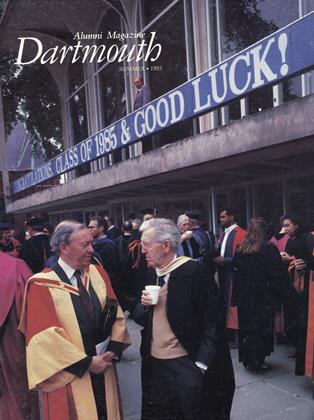One of the oldest remaining musical manuscripts in the Western world and a Macintosh computer are unlikely partners in an effort to turn some thousand-year-old notes into a singable tune. The students in a Dartmouth music class, their professor, and a research scholar from the National Endowment for the Humanities have all turned their attention to that effort. The subject of their interest is a leaf of medieval parchment known as "the Dartmouth fragment." Donated to the College eight years ago by renowned collector and art historian Mark Lansburgh '49, the fragment has been tucked away in a Special Collections vault in Baker Library.
Associate Professor of Music William Summers brought the page out of the archives on April 10, when Thomas Kelly, a senior scholar of the National Endowment for the Humanities, came to Hanover to help students in Music 39 (History of Music Style I) identify the parchment and start turning its symbols into sounds. Kelly did both, in a two-hour public event that was as magical as it was historic. The fragment was an intriguing mystery he'd only heard about, but after just a few minutes, he was reading off the ancient scrawl - a calligraphic flow of notes so small and meticulous it's hard to believe they were produced freehand. In another few minutes, Kelly had identified the music as a Gregorian chant - part of a Sexagesima, sung the second Sunday before Lentmost likely written by Beneventon monks between 1000 and 1050. A look at the decayed edges of the 8½-by-11-inch fragment told him its survival is a lucky accident; the whole manuscript, possibly as long as 100 pages, had likely been torn up and the pages used for book binding. Another five minutes, and he had translated whole lines of one of the fragment's 13 compositions on the blackboard. By the end of the lecture he and the class were belting out tones that had been silenced for almost 900 years.
Now the fragment is a hot item in more places than Hanover. When the news of it reached "All Things Considered," the National Public Radio show got Summers on a broadcast; Boston's Channel 56 scheduled Summers and a student for an interview; and NBC "Nightly News" sent a threemember crew to Hanover for three days. "I think it's captured the imagination of the general public because it's so very old," said Summers. "It's incredible how much allure this ancient manuscript has; you're drawn right to it."
If Kelly caught the media's attention, he certainly captivated Summers's students. For them, that April afternoon was only a beginning. With the help of a Macintosh computer, loaded with a special program to translate medieval music, they've printed out a standard modern text of the composition Kelly helped them sing; and they're still hard at work translating the remaining 12 compositions. "It's a unique experience," said Summers. "It's really alive for the students. They're dealing with the real thing - the manuscripts that were intended to transmit this music to the future. They can touch it and feel it and sing it. They're also getting a special glimpse of the daily activities of the people back then. We're all getting a sense of history directly from this manuscript."
 View Full Issue
View Full Issue
More From This Issue
-
 Feature
FeatureA Humanist Ponders the Future of Liberal Education
June 1985 By Charles T. Wood -
 Feature
FeatureAn Apple on Every Desk
June 1985 By Fred Pfaff '85 -
 Feature
FeatureThe Great Train Robbery
June 1985 By Fred Pfaff '85 -
 Feature
FeatureThe Wentworth Bowl
June 1985 By Barbara J. MacAdam, Curator, Hood Museum of Art -
 Cover Story
Cover StoryValedictory Address
June 1985 -
 Feature
FeatureReunions 1985
June 1985 By Robert Frost
Article
-
 Article
ArticleMasthead
May, 1926 -
 Article
Article1986 Dartmouth Alumni Directory Corrections
JANUARY/FEBRUARY • 1987 -
 Article
ArticleOTHER WINTER SPORTS
JANUARY 1971 By JACK DEGANGE -
 Article
ArticleGive a Rouse
APRIL 1998 By Kevin Whitcher '99 -
 Article
ArticleMy Space
SEPTEMBER | OCTOBER 2015 By NAOMI HEINDEL ’ 07 -
 Article
ArticleAbout 25 Years Ago
October 1937 By Wared Wilkins '13

